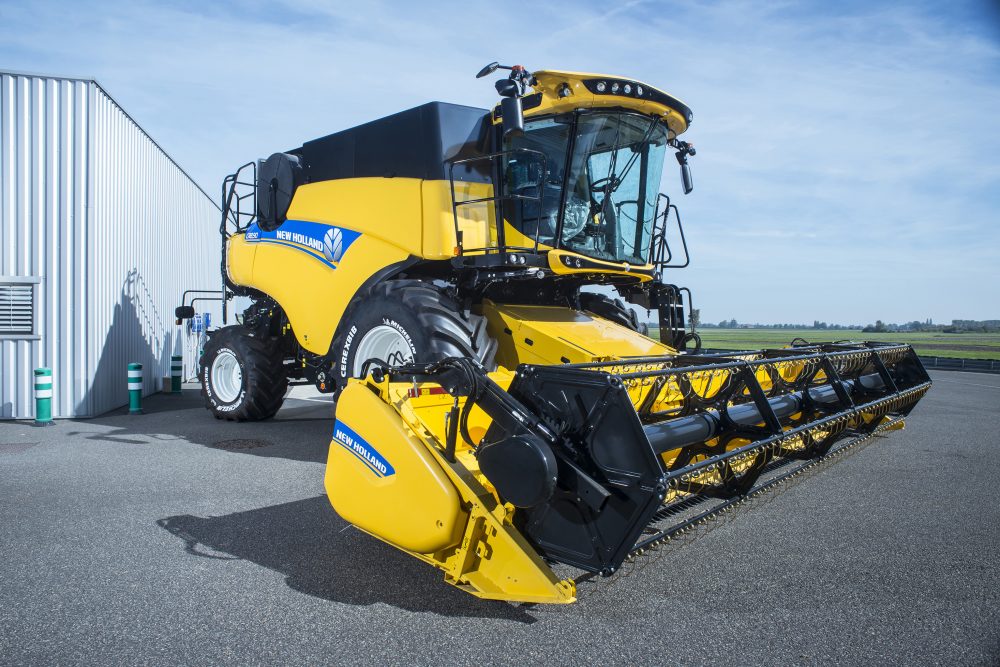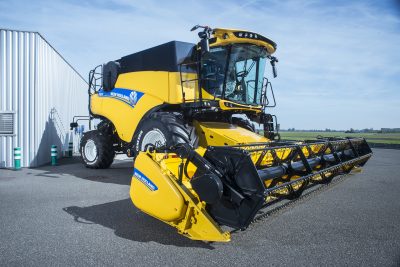The head of Michelin’s agricultural technical team in the UK and Ireland is advising farmers to focus more time on selecting the right tyres for the rear of their harvesters, rather than putting all the focus on the front axle – as traditionally happens.
Gordon Brookes, Customer Engineering Support Manager at Michelin, believes the issue is increasing in importance as harvesters grow in size, weight and power. He also warns that most machinery dealers don’t focus heavily on tyres when securing an order – so farmers should seek expert advice from their tyre manufacturer or dealer.
Offering advice ahead of the 2019 harvest season, he says: “The rear axle is the smallest tyre, so that’s always going to be where the damage is most likely to be done. Farmers naturally look at the front because that is where everything is going on; whilst often forgetting that when the combine is full, the back end is extremely heavy – despite being on a very small tyre.
“When travelling without the header mounted, there is no weight transfer from the rear axle so the rear tyre loads can be very high. Sometimes you’ll even see the rear axle specified on the same tyres you’d fit on a loader – so shifting some of the focus from front to rear would pay huge dividends so far as soil compaction is concerned.”
Whilst four-wheel drive harvesters require lugged tyres on the rear, Brookes says farmers can access a much wider range of fitments if they’re specifying a two-wheel drive machine.
“If minimising compaction is your number one issue then you can select a flotation tyre like the Michelin CargoXBib. That’s designed to spread the weight of laden agricultural trailers, so it’s always going to be better at reducing compaction than a smaller fitment.”
Another area where Brookes says farmers should focus their attention is tyre pressures.
“Nearly all machinery manufacturers leave tyres at the fitting pressure – normally around 35psi – and then the dealer is supposed to amend the pressure if it is appropriate prior to delivery. But only a small percentage do – invariably as they don’t know how the machine will be used,” he says.
“If the farmer is combining linseed, for example, it has a different density to wheat or barley – and the tyre pressures are dependent on what you are harvesting.”
Michelin is happy to provide bespoke tyre pressure recommendations if a harvester is on Michelin tyres. It will even arrange for one of its Account Managers to come out to weigh a machine on-site and calculate the optimum pressures.
Brookes says that setting up new harvester tyres correctly is essential, particularly if you’ve gone for a high technology fitment like a tyre from its CerexBib family.
“Bear in mind that a typical combine might have four different headers and they will all be different weights. The tyre pressures will be different in each scenario.”
Brookes’ final tip for specifying harvester tyres is to opt for the latest CFO+ (Cyclic Field Operations) rated tyres where possible, because they offer the highest load capacity and the lowest pressure for a given load.
“CFO+ rated tyres are based on a 1,500m cycle, and if that’s not enough to fill the tank, then you most likely haven’t got a good crop! There are other cyclic markings for other tyres on the market, but the load benefit isn’t as high, and the cycle distance isn’t as great,” he says.
“Some are only up to 600m, plus they can come with other limitations for things like working on side slopes. It pays to specify the best tyre you can from the outset, and then enjoy the benefits.”
Farmers can seek expert tyre support through their local Michelin Exelagri dealer; a network of more than 50 dealerships in the UK and Ireland which have been audited to ensure they can offer the support required to help farmers extract the maximum performance from their tyres.
Michelin also operates the largest team of dedicated account managers in the agricultural sector, who are on hand to visit customers.
For more information about the range of Michelin farm tyres available visit http://agricultural.michelin.co.uk or tweet @MichelinAgriUK.
Ends
Michelin, the leading tyre company, is dedicated to enhancing its clients’ mobility, sustainably; designing and distributing the most suitable tyres, services and solutions for its clients’ needs; providing digital services, maps and guides to help enrich trips and travels and make them unique experiences; and developing high-technology materials that serve the mobility industry. Headquartered in Clermont-Ferrand, France, Michelin is present in 171 countries, has more than 114,000 employees and operates 70 production facilities in 17 countries which together produced around 190 million tyres in 2017. (www.michelin.com)
For further press information please contact:
David Johnson, Michelin Press Office
Tel: + 44 (0) 1782 402341 Email: d.johnson@michelin.com
Dan Jones or James Keeler, Garnett Keeler PR, Inver House, 37-39 Pound Street,
Carshalton, Surrey, SM5 3PG
Tel: +44 (0)20 8647 4467 E-mail: dan.jones@garnettkeeler.com / james.keeler@garnettkeeler.com
MICHOHT/226/19






